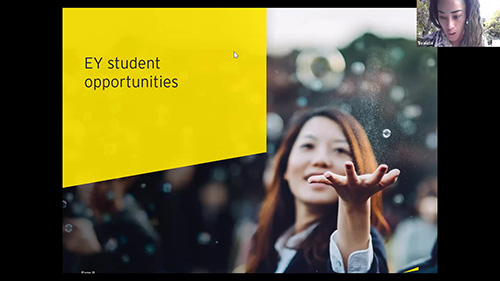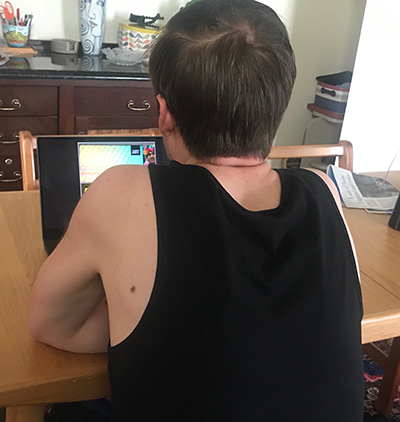5 Tips on looking good (professionally) online
Do you want your employment opportunities doomed because of your online look? Do you want to stand out from the crowd because you have vegemite on your shirt, greasy hair, an unmade bed or a flatmate fooling around in the background? Maybe not?
Here are 5 tips on how to present yourself well online in front of your camera
1. Video on/mic off

Always have your video on when attending’ online presentations. If that means you have to find another place in your house to position yourself, so be it. Presenters and employers want to see a person, not a name on a screen. They want to engage with you and for you to engage with them. Otherwise, why not do it by phone?
But they don’t want to see your messy bed, untidy kitchen sink or your flatmate wandering across the back of the screen half dressed. They also don’t want people or pets distracting you.
And please, please have your microphone muted until you want to ask a question. Your mic picks up lots of noise, rustling paper, slurping coffee, boisterous animals, kids or flatmates in the background, the neighbour’s lawnmower... the list goes on.
2. Check your camera set up

Always do a practice run to get your camera distance and angle right. Make sure you are not sitting too close to the camera, or too far away. You don’t want to look like you’re in another room, nor does the recruiter or presenter want to see the inside of your nostrils - or your bemused forehead.
Once you are online, remember you are now in a live interview. Think about your body language. Nod, make eye contact, sit up straight, smile. Don’t yawn into the camera or start cleaning your nails, or worse!
NB: if you have only changed the top half of your pyjamas, don’t get up in the middle of the presentation or interview to shut a door or open a window. It has happened and it looks hilarious, but strangely enough it is NOT good interview practice.
3. Dress appropriately

Think of best practice when applying for a job and use the same rules (at least from above your waist) with online interviews or presentations. That means a casual singlet is not going to wow an employer - unless they are the designers of that singlet!
Be tidy, particularly your face and hands, because a screen highlights a lot of detail when it's bigger than a cell phone.
4. Etiquette ... you know... manners
As well as having your video on/mic off until asking questions, you must also ‘arrive’ on time. Be in the waiting room (for Zoom) or be ready online five minutes before your interview or the employer presentation is scheduled. Being late gives a very bad impression. In real life or online.
5. Ask a question – a good question
Presenters put time and effort into doing online presentations. They want to pass on ideas and advice and to ‘meet’ students. So make sure you network with them through question time. Remember your name usually appears on your question on web chat. If it is a good question, they will probably remember you.

But asking a presenter if they might have a job for you is not a good way to network online. How would they know if you’d be a good person to employ? (Yep someone did that recently). Listen to what they are saying, jot down things you’d like to ask and then put up your question without grammar and spelling mistakes. That bit is easy because you’re probably on your laptop and can quickly put your question through a spell check before popping it into the chat.
With job interviews it is also vital that you have a couple of questions prepared to ask the interviewer before the interview ends, but do not ask about salary and holidays at that point. Questions about the number of people you may be working with, or what the interviewer likes about the organisation and their role or something about the company that you have seen on their website. All these questions show interest in the role.
We run a number of employer presentations online and in person through the semester. We also run workshops on interview practice and job search that can help you think about how to approach interviews. You can register for our workshops and presentations on Elab Online. Not used Elab Online before? It's easy - just click on 'Current Student', put your AUT name and password, and you're in and ready to access everything you need.
Written by AUT Employability and Careers writer Angela McCarthy
Employability and Careers Blog
Find ideas on how to get better at job search through your CV or LinkedIn profile, learn from the feedback of employers, and be inspired by stories of AUT students and graduates as they network, go to job interviews and find their feet in their chosen career.
